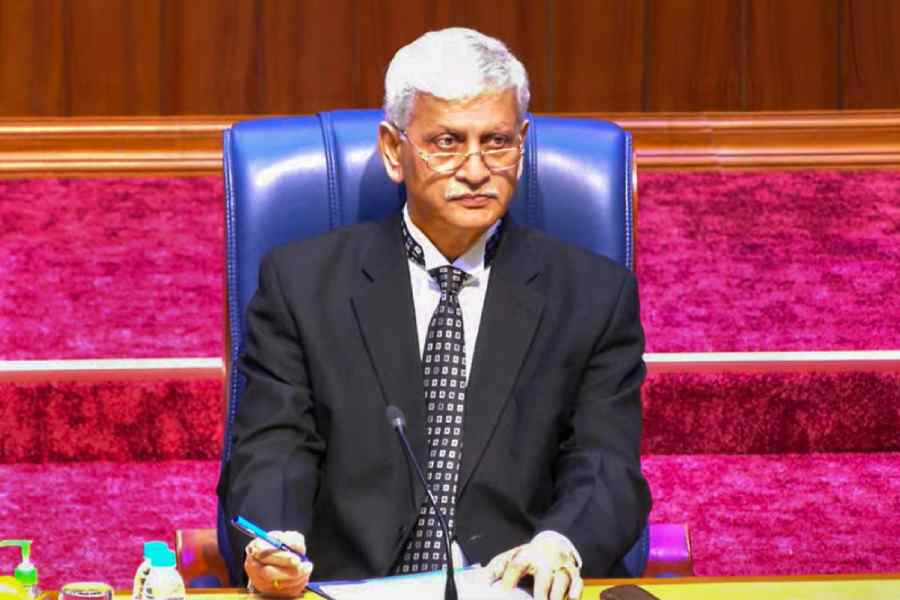The Supreme Court on Monday mandated “search-cum-selection committees” headed by former Chief Justice of India U.U. Lalit for all state universities in Bengal to end the standoff between the Mamata Banerjee government and governor C.V. Ananda Bose on who should appoint the vice-chancellors.
The order says the chief minister will go through a shortlist prepared by the panels and recommend “names in order of preference”, and the chancellor (governor) shall appoint the VCs “in the same order of preference as recommended by the chief minister”.
If the chief minister and the governor differ on the final choice, the Supreme Court will be the arbiter, the order says.
“We welcome the order because it reflects the contention of the state government,” Bengal education minister Bratya Basu told reporters.
“The Supreme Court has acknowledged the role of the chief minister in choosing the... vice-chancellors. The chancellor will choose the candidates vetted by the chief minister.”
The Bengal government had in 2022 passed a bill in the Assembly replacing the governor with the chief minister as the ex-officio chancellor of state universities. But the governor is yet to clear the bill.
The apex court order came on an appeal from the Bengal government and certain PIL petitioners challenging the concurrent judgments of a single-judge bench and a division bench of Calcutta High Court that upheld the interim appointments of VCs made by the governor to several state universities.
The bench of Justice Surya Kant and Justice K.V. Viswanathan said that since the directions were being passed under the Supreme Court’s extraordinary powers under Article 142, and with the consent of the two disputing sides, “we will not entertain any objection from any side for non-compliance”.
Highlights of the 24-page order:
⦿ Justice Lalit is to constitute separate or joint search-cum-selection committees for the universities, keeping in mind the nature of subjects and disciplines taught in these universities.
⦿ He will nominate four people from among the empanelled experts to each committee. (The court has drawn up a large panel of experts based on names suggested by all the parties including the state government, governor and PIL petitioners.)
⦿ The chairperson (Justice Lalit) will preside over every search-cum-selection committee and, therefore, each will have five members.
⦿ The committee will prepare a panel of at least three names — alphabetically and not in order of merit — for each university.
⦿ The chairperson will constitute the committees — for groups of universities or individual universities — preferably within two weeks.
⦿ Bengal’s higher education department will issue advertisements seeking applications for VC posts, to be submitted within four weeks. The ads will make a specific reference to the court order “to infuse confidence, leaving no uncertainty in the minds of the meritorious aspirants in submitting their claims”.
⦿ The state government will scrutinise the applications within a week and place them all before the chairperson, who will get the dossier of each candidate prepared for the committee’s consideration.
⦿ The committee “may endeavour to complete their task within three months from today”.
⦿ The committee recommendations, endorsed by the chairperson, will be sent to the chief minister.
⦿ If the chief minister finds any shortlisted candidate unsuitable, “remarks to this effect along with supporting material and the original record of the recommendation” will be put up before the chancellor (governor) within two weeks.
⦿ The chief minister will be entitled to recommend the shortlisted names in order of preference.
⦿ The chancellor “shall appoint the vice-chancellors out of the empanelled names in the same order of preference as recommended by the chief minister”.
⦿ If the chancellor has reservations against any of the shortlisted candidates and/ or the remarks made by the chief minister against any shortlisted candidate, he can put up his own opinion on file, supported with reasons and relevant material.
⦿ The chancellor will accord his approval (except when there is a difference of opinion) within two weeks of the receipt of the file from the chief minister.
⦿ The relevant government department will notify the appointment within a week of the receipt of the chancellor’s approval.
⦿ If the chief minister “has objected to the inclusion of any name in the panel and such objection is not acceptable to the chancellor or where the chancellor has an objection against (the) empanelment of any particular name for which he has assigned his own reasons, all such files shall be put up before this court”. The court will take the final decision “after giving reasonable opportunity of being heard to the objectors”.
Additional reporting by our Bengal bureau











